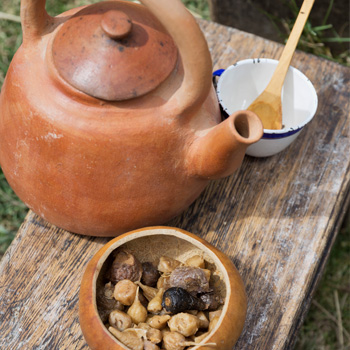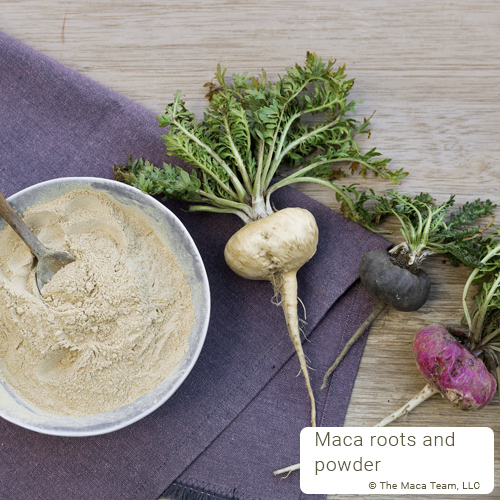Maca For Women's Fertility
Introduction
Starting or expanding a family is one of the largest decisions and experiences we face in our adult lives. For some, a pregnancy comes easily. For others, it’s more of a challenge. In fact, the National Institute of Health estimates that 9% of men and 11% of women experience some sort of infertility during their optimal reproductive years. That number also goes up significantly with age.
While there are now a variety of treatments, procedures and interventions to help women conceive, they are often expensive and can even be risky. Many medical professionals will resort to them only in unique circumstances or after other methods have been exhausted.
Often, the first recommendation for a woman trying to get pregnant are lifestyle changes that can include altering her diet, activity levels, stress levels and environment. Among these suggestions, an ancient natural remedy from Peru has gained popularity outside of South America over the past 20 years. It’s called “maca” and this article will explore how maca root can support women’s fertility.
The history of maca’s use for fertility
Maca is a root vegetable that grows predominantly in the Andes mountains of Peru. Maca thrives at high altitudes, and like broccoli, Brussel sprouts, and cauliflower belongs to the cruciferous vegetable family.
Archaeological evidence suggests that it was discovered up to 10,000 years ago by people indigenous to the area. According to local legends, these people encountered the power of maca somewhat by accident. The story goes that they allowed some of their livestock to graze in an area where maca grew. Over time, they realized that these animals had more and healthier babies than the animals that didn’t eat maca.
It wasn’t long after that people began trying maca for themselves – and experiencing similar results. The root subsequently became known as a fertility and overall health booster and eventually became highly valued. In fact, during the Incan empire maca was used as money and taken as “tribute” or taxes by the imperial leaders.
Maca survived the Incans, the Spanish colonizers, centuries of marginalization and to this day is used locally to enhance fertility. For many doctors in the highlands of Peru, maca is still the first recommendation given to women trying to conceive.
Research on maca for women’s fertility
While the history of using maca root for fertility is compelling and makes for interesting conversation, there is also a growing body of scientific research that suggests that maca root could be helpful to women trying to conceive. So does maca increase fertility?
Let’s look at 4 main areas in which maca powder can be beneficial for women’s fertility.
Libido
One of the most famous potential health benefits of maca root is increased sex drive in both men and women. Peruvians have used maca root for centuries to positively affect their sex drive. In the last decade, scientists set out to examine this long-standing folk belief.
A study performed in 2002 showed that men who took 1.5-3 grams of maca a day reported having a higher libido than the placebo group.[1] Another study shows maca root could improve sexual desire in women. Specifically, a 2015 study highlights that maca could be helpful for sexual dysfunction in women taking antidepressants.[2] In this study, a group of 45 women was randomly divided and given either a placebo or 3 grams of maca root. The group of women who used maca root reported improved sexual desire after 12 weeks.
Hormones and Stress
Because maca is an adaptogenic herb, it is believed to help the body manage stress. One way in which maca root could aid stress management in the body is by supporting  the endocrine system. It is thought maca root can improve the function of the endocrine system by nourishing and supporting the hypothalamus and the pituitary glands, which in turn facilitate the production of proper hormone levels. An adequate hormone level is essential not only for conceiving but also for carrying to term successfully.
the endocrine system. It is thought maca root can improve the function of the endocrine system by nourishing and supporting the hypothalamus and the pituitary glands, which in turn facilitate the production of proper hormone levels. An adequate hormone level is essential not only for conceiving but also for carrying to term successfully.
Due to the heavy presence of estrogen in our environment, an imbalance between estrogen and progesterone can occur. This condition is called estrogen dominance and could also play a role in difficulties with conceiving and carrying to term. Maca’s positive effects on estrogen levels could be a helpful tool in increasing fertility. Specifically, maca could help establish a healthy estrogen and progesterone balance in women.[3] Hormonal balance also promotes healthier egg production.
Having a suitable estrogen level could also alleviate problems with hot flashes and sleep irregularities.
Blood Pressure
High blood pressure is a problem for about 5% of all women. High blood pressure is even more prevalent in women who struggle with infertility. Maca is thought to have the potential to help with blood pressure regulation. For example, a study performed in 2015 found that consuming 3.3 grams of maca daily for three months was linked to lowering blood pressure in participating women.[4]
Vitamins and Nutrients
When hoping to get pregnant, it’s essential to make sure the body is operating at its best. This means supporting the immune system, getting enough sleep, and maintaining proper vitamins and nutrients levels.
Maca root is often referred to as a superfood, and for a good reason. Maca root is packed with minerals like calcium, potassium, iodine, manganese, zinc, and a small amount of iron. In addition to minerals, maca root is rich in vitamins. It contains B1, B2, C, and D vitamins. When it comes to protein, maca root is an excellent source of all nine essential amino acids and is a complete protein source.
Maca can also support male fertility
Although many women turn to maca for help with fertility issues, it is helpful to know that maca is also consumed by men to increase the chances of conceiving.
Excess estrogen in men can be responsible for erectile dysfunction, lowered libido, and low sperm count. By reducing estrogen levels, it is believed that maca may help with erectile dysfunction. A 2009 study looked at the effects maca extract had on a group of men with erectile dysfunction (ED). The findings showed that those participants that took 2.4 grams of maca a day for 12 weeks reported an increase in sexual well-being, while participants who took a placebo did not.
Maca root may also help balance hormones and regulate sperm count in men. Hormonal imbalances like the overproduction of testosterone can negatively impact sperm count. A study performed on seven male participants found that those taking 1.5-3 grams of maca extract a day for four months reported an increase in sperm count, seminal volume, and sperm motility.[5]
Animal studies also shed light on how maca can increase sperm count. One animal study looked at breeding bulls and how maca root affected the quantity and quality of sperm and mating behavior.[6] It was discovered that supplementing maca over ten weeks improved sperm quality.
What type of maca to take for female fertility?

First of all, there are 3 major colors of maca – red, black and yellow.
Red maca amounts for about 20%-25% percent of all maca. Black maca is the rarest type of maca and comprises only 10%-15% percent of the plant’s population. And yellow maca is the most common type, representing about 60%-70% of the species.
When it comes to fertility, red maca is generally considered best for women, while black maca is thought to be the most beneficial for men. Click to learn more about red maca benefits and black maca benefits.
Beyond the color, it’s important for you to know that for a small amount of people raw maca can cause mild stomach upset. If you have a sensitive stomach at all, we recommend using gelatinized over raw maca.
Conclusion
If starting or expanding a family is something that has been a struggle for you, we hope that this article has been helpful for you. Over the years that we’ve been sharing maca, we have seen several women have success when using maca to enhance their fertility. You can read more about their experiences here. Other women have tried it and not gotten results. But overall, given the history and the research associated with maca and female fertility, we feel it’s a food that can contribute to conception.
Finally, it’s important to share that this article is not meant as medical advice. If you have any doubts about adding maca to your diet, please visit with a competent healthcare professional.
We wish you all the best in your journey to conception.
Enjoy the day!
![]()
